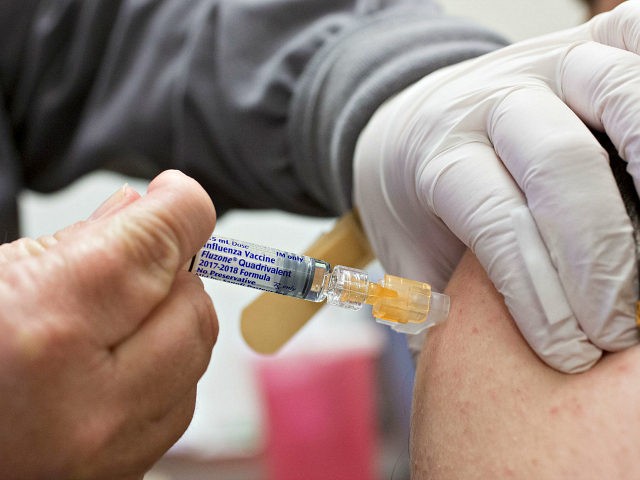The Communist Party of China is struggling to convince citizens to receive influenza vaccinations to protect them in the upcoming flu season after years of corruption scandals involving faulty, watered-down, or otherwise useless vaccines, the South China Morning Post noted on Monday.
About 30 million flu shots are distributed in China each year. This year, authorities have increased production to ensure that “up to 50 million doses [are] available,” Zhang Hui, deputy director of China’s National Institutes for Food and Drug Control, said late last month. Even with the increase, “the coverage rate would rise only slightly to 3.57 percent,” Zhang cautioned.
“[W]hile China has the capacity to increase flu vaccine supply, public demand has remained low because of a lack of trust, a lack of public awareness, poor access, as well as cost,” Huang Yanzhong, a senior fellow for global health at the Council on Foreign Relations, told the South China Morning Post (SCMP). To get a flu shot in China, “most people have to go to a hospital and pay around 100 yuan ($14.60),” according to the report.
Xu Liang, a 68-year-old from the city of Wuxi, located near Shanghai in the eastern province of Jiangsu, told the SCMP that he has not decided whether or not to get a flu shot this fall.
“I’ve heard friends discussing it, saying this year is special because of the coronavirus and we are among the high-risk group. But 100 yuan is too much for retirees like me. It’s five days of my family’s food budget,” Xu, who has never gotten a flu shot before, explained.
Despite having pre-existing health conditions such as high blood pressure and other illnesses that make him more vulnerable to the coronavirus, Xu said he still hesitates to receive a Chinese-made vaccine.
“I don’t know how effective it is. And I doubt its quality. I remember there were scary reports of substandard vaccines years ago,” he added.
Xu referred to the Chinese vaccine maker Changchun Changsheng Bio-technology, which sold over “250,000 DPT vaccines in Shandong province before tests in November 2017 revealed that some were not effective,” according to the SCMP. A provincial regulator fined Changchun Changsheng 3.4 million yuan ($502,200) for knowingly selling the ineffective DPT vaccines, according to the report. DPT vaccines immunize people against diphtheria, whooping cough, and tetanus. In China, DPT vaccines are administered to babies as young as three months old.
Changchun Changsheng was also fined “a record $1.3 billion in 2018 for fabricating records for a rabies vaccine for humans,” Agence France-Presse (AFP) reported.
In August 2018, Chinese leader Xi Jinping personally presided over a Communist Party hearing to hold at least 40 government officials, including seven at the provincial level, accountable for the scandal. The committee fired about 40 other officials for their role in the corruption. At the meeting, Xi “stressed that those involved in the case should be held accountable and punished severely according to the law.” He also “instructed all-out efforts to be made to ensure the bottom line of safety and [to] safeguard the public interest and social stability,” state-run news agency Xinhua reported at the time.
The Changchun Changsheng corruption scandal caused a rare spate of public protests in China, where the Communist Party is normally quick to extinguish anti-government sentiment.
In July 2018, dozens of angry citizens gathered outside Beijing’s National Health Commission and National State Drug Administration buildings. They demanded stricter punishments for the pharmaceutical executives and CCP officials who allowed the ineffective vaccines to be sold to the public. Some of the demonstrators pushed for greater government transparency. Despite official CCP statements claiming that the vaccines caused no serious health consequences, some parents insisted that their children had been made ill by the faulty injections. According to the AFP report, Changchun Changsheng’s defective DPT vaccine “caused paralysis in a few cases.”
In January 2019, another vaccine protest erupted, this time by parents of 145 children made sick from an expired polio vaccine. Outraged parents gathered outside the Licheng government health center in Jinhu, Jiangsu province. A video of the angry mob appears to show participants beating a government health official outside the building.
“[S]everal other cases [of vaccine corruption] have been reported by Chinese media in the past year, including fake vaccines in a southern hospital and children getting shots for the wrong illness in northern Hebei province,” AFP’s report revealed in June.
Despite the CCP’s ongoing battle to assuage public suspicion over relatively standard vaccines, it has insisted in recent months that it will soon release an experimental Chinese coronavirus vaccine.

COMMENTS
Please let us know if you're having issues with commenting.